feature image by Rich Fury/MSG / Contributor via Getty Images
I remember it like it was yesterday. Mid-April in Austin, a tectonic shift was happening under our very feet. I am talking about Troye Sivan and Charli XCX’s SWEAT Tour announcement. I knew, as soon as I saw it, who I needed to speak to: my best friend R, his boyfriend L, and my girlfriend, or as I like to refer to us as, the Gay/Lesbian Solidarity Committee (I have never referred to us as that until just now).
It seems inconceivable now that there was a world before brat, but thankfully, the alliance between my friends with my girlfriend and I allowed us to be ahead of the curve. We all had understood Charli XCX as a pop music force, but perhaps no one more than my girlfriend. At the time of this tour announcement, Charli XCX was somewhere in the 300s on Spotify’s most listened to artists in the world — the idea of her selling out a stadium tour seemed impossible, but my girlfriend assured us it was only a matter of time. And given that she had also predicted the meteoric rise of Chappell Roan and MUNA, we had to trust her. With the explosion of brat summer, I was thankful this gay premonition was shared with me so we could obtain tickets before the price hike to come in the summer’s hot aftermath.
On the flipside, R and I had been avid Troye Sivan listeners for a long time. R’s most listened to song every year is the Troye/LAUV collab “i’m so tired…” and I spent fall 2020 playing his In A Dream EP on a dazed, quarantined loop. I had also been a teenager in the 2010s, watching the ancient text as it was being written. Needless to say, all four of us in one way or another had earned our right to be at the SWEAT Tour in the most pretentious, mean-gay manner possible.
When buying tickets for their Chicago tour date in April, I couldn’t imagine the pop boom that was to come. I would’ve been excited regardless, but now that “360” has likely been played no less than 1000 times by me already today, it was a cultural phenomenon I was desperate to see myself a part of. I waited eagerly all year — and this past weekend, our time had come.
After a long Chicago weekend of important gay activist activities such as prowling Wicker Park for lavender lemonades and poppers, our last day in town was showtime. My girlfriend and I had traveled to Chicago from out of town to stay with my friend and his boyfriend. We all got ready in their wood-paneled two-story walkup that I desperately wanted to steal out from under them, donning our varying stages of brat dress: neon green tank tops, assless chaps bought from iHeartRaves.com, and my girlfriend’s disco ball corset that she made entirely from scratch by hot-gluing small mirrors to a body-shaped thermoplastic (hot). We took the bus down towards United Center, which at every stop slowly emptied of regular people and filled with loud gay people dressed in green (it was clear we were on the right bus). The stream into the stadium was loud and thick with the scent of inhalants, cologne, eagerness and, of course, sweat. Because we had bought our tickets before brat summer, we were lucky to have a decent view for a decent price. We settled in with our expensive margaritas in breakable plastic and waited for the show to begin.
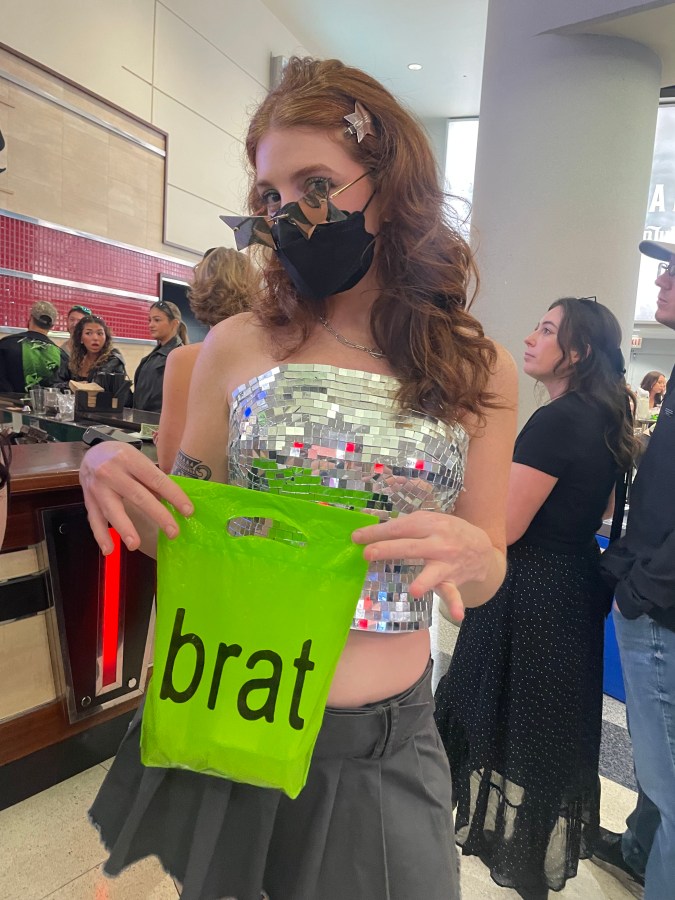
I would be remiss to begin this account without acknowledging the opener. Shygirl, a DJ and performer who has collaborated with artists like FKA twigs, Lady Gaga, Lil Uzi Vert, and Charli, came onstage at 7:30, on time (unheard of for gay people). Her set, a cool 40 minutes, was simple but effective: just her, two dancers, and the DJ behind her, with a gorgeous psychedelic menagerie of visuals in pinks and purples and oranges playing on the screen behind her.
Oftentimes I feel bad for openers, especially of large stadium tours. The energy of the crowd doesn’t always match the scope of the venue, and people tend to come in mid-set or after. But for Shygirl, it was clear she had fans in the crowd of her own; the vibe was frenetic, with those in the pit and nosebleeds alike screaming the words right back at her. While I personally had not known Shygirl before, I certainly know her now, and her set and the fans’ excitement for her was a perfect appetizer to a tantalizing, delicious meal.
I can say with a full, only slightly biased heart, that the SWEAT Tour concert is one of the most energetic, enjoyable, and powerful concerts I have attended in recent years. Rather than a structure of one and then the other, the setlist wonderfully wove Troye and Charli’s discographies together, allowing each ample time for costume changes and water breaks without diminishing the fantasy or reducing any of the fire in the crowd. The show opened up with Troye’s Bag Raiders-sampled “Got Me Started,” the svelte Australian pop star accompanied by a sextet of hot, talented dancers. As someone who has known Troye since he was collaborating with Tyler Oakley on YouTube, since before Blue Neighborhood, it was a welcome whiplash to watch the passion of his stage persona. It’s strange to think there was ever a time I was shocked to see Troye making music, because now it is clear that if there is a God, she made Troye for this exact purpose. The heavy synth, beautiful dancers, and hypnotic strobe lights made the entire stadium feel like a gay club in the best possible way. And speaking of being gay, getting to hear “What’s the Time Where You Are?” live, the song I played relentlessly when beginning to date my long-distance girlfriend (despite living in the same time zone), was its own magic.
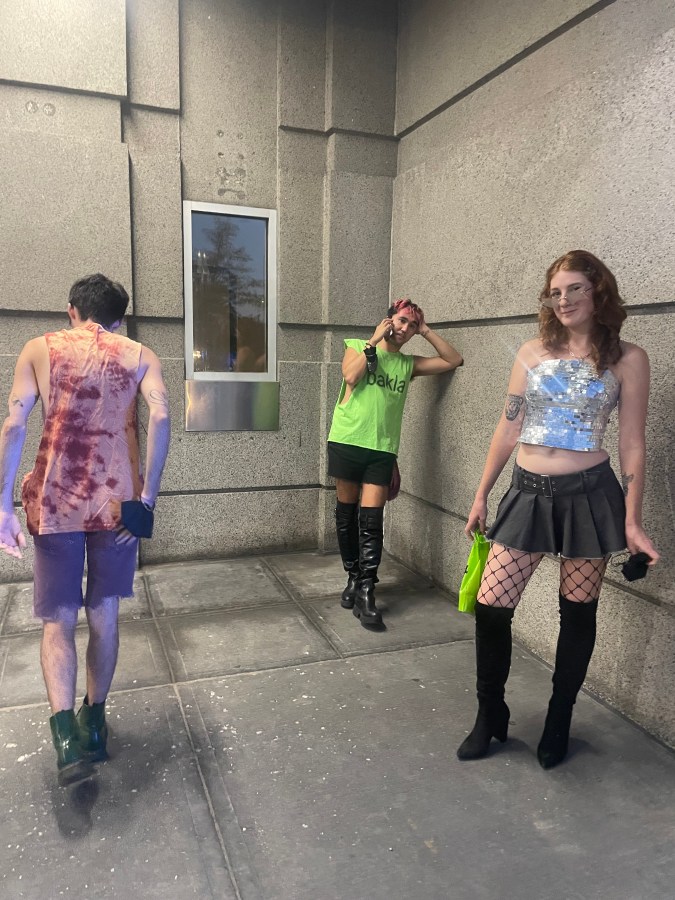
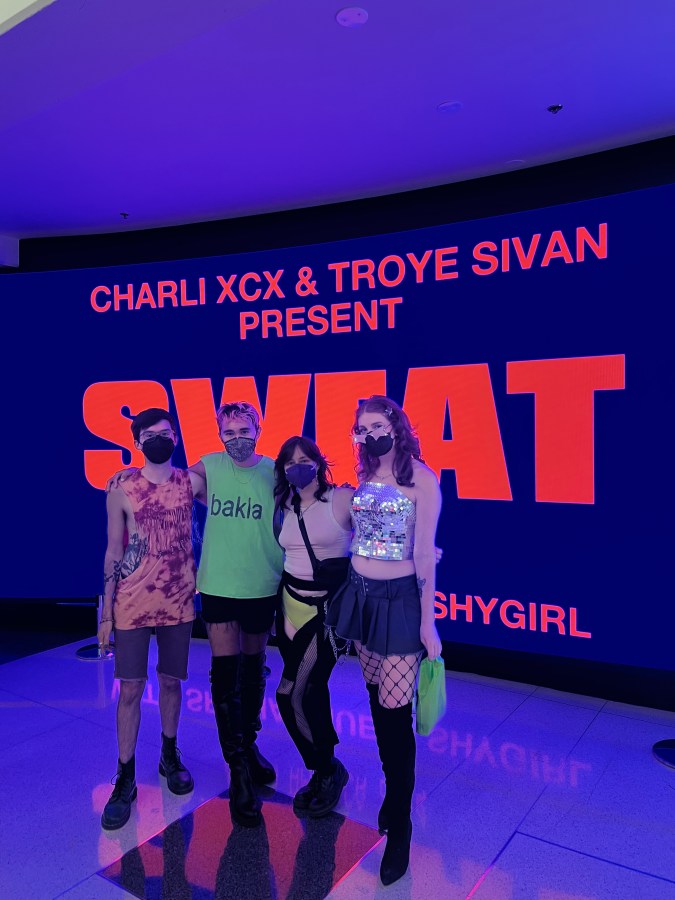
After Troye’s first three songs, it was Charli’s turn, and oh, what a turn it was. A giant green banner proclaiming “brat” fell from the ceiling to cheers comparable, I believe, to ancient Romans in the colosseum watching gladiators swing at each other. I have been a certified concert girly in my life — perhaps not as much as others I know, but enough to have seen great and horrifying shows before. I can say with confidence the control Charli had of her crowd was a power that could be harnessed to fuel cities. What was most evocative was that she controlled the crowd with so little: While I thought Troye’s six dancers and minimal visuals were already exciting and uncomplicated, Charli had simply herself. No dancers, mild visuals, and one cameraman following her — but it was anything but simple. The use of the camera was provocative, following Charli and Troye alike over and under the stage (at one point Charli left a long, slobbery lick on the transparent stage that the camera caught from underneath, and at another humped the stage to the fans screaming Billie Eilish’s verse from “Guess”). It was clear the minimal approach was a deliberate choice, a chance to show that Charli did not need a million dancers and props and costume changes to hold the crowd’s attention: All she needed was herself. She had us in the palm of her hand. If Taylor Swift can get her fans to vote with her influence, Charli could get hers to assassinate someone.
The braid of Troye and Charli allowed the show to remain upbeat and full throughout. While I don’t doubt either of them could’ve held a crowd’s attention on their own for the full two hours, the ability of them to swap one another out kept the setlist fresh between Charli’s intense hot-girl hyperpop and Troye’s groovy synthplay. Several of the songs on the setlist included artists not present: Troye’s “Dance To This” with Ariana Grande, as well as Charli’s “Guess” featuring Billie Eilish, and the Internet-crashing “Girl, so confusing” with Lorde. I was curious how these songs may be approached, particularly Charli’s. I assumed she would sing the non-remix versions, despite those being less popular. But no, the inclusion of these songs proved yet again Troye and Charli’s mutual confidence in their abilities that paid off: When the verses for those not present came on, the fans slid into the roles with ease, screeching the lyrics back to the stage (I’d wager “Charli likes boys but she knows I’d hit it” was screeched the loudest and with the most gusto).
Both Charli and Troye embody a slithery sensuality throughout the show, but despite what some may wish to claim, I interpreted it as anything but mindless. The entirety of Troye’s time onstage was, to me, a queer reckoning. It reminded me in many ways why I love pop music, and it is because, for many queer people, it is a haven of joy amidst a tumultuous, hateful world. Much of Troye’s choreography could easily be reduced to overt sexuality, so intense it became almost comical or campy — but I wouldn’t reduce it this way. Rather, the calculated choices — from a male dancer holding the microphone at his crotch while Troye kneels and sings the “Got Me Started” bridge up into his eyes, to a lapdance during “One Of Your Girls” ending in essentially a dancer dry-humping Troye on the floor of the stage — felt, to me, like a reclamation and a declaration.
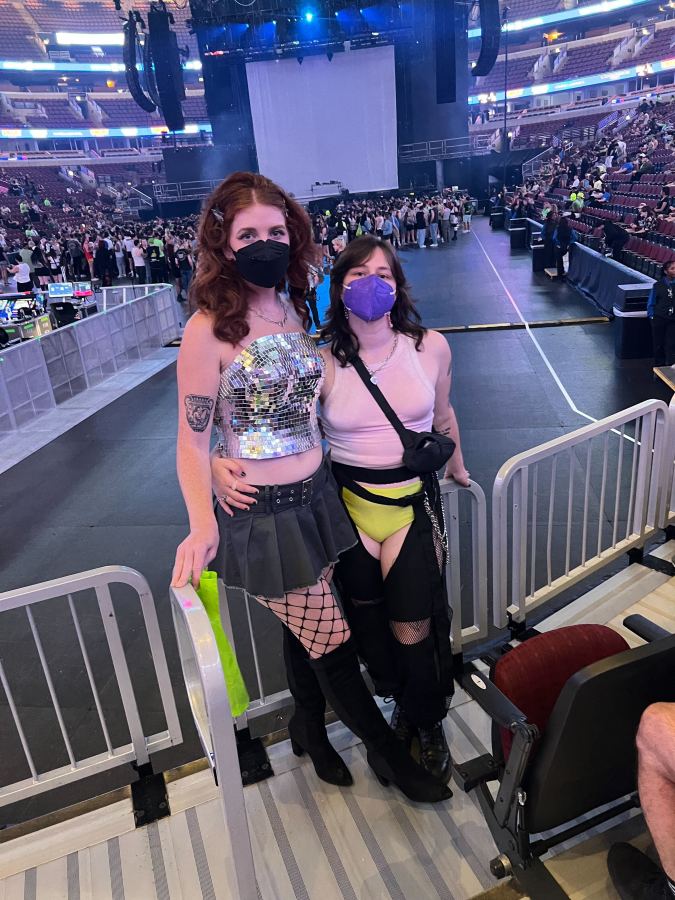
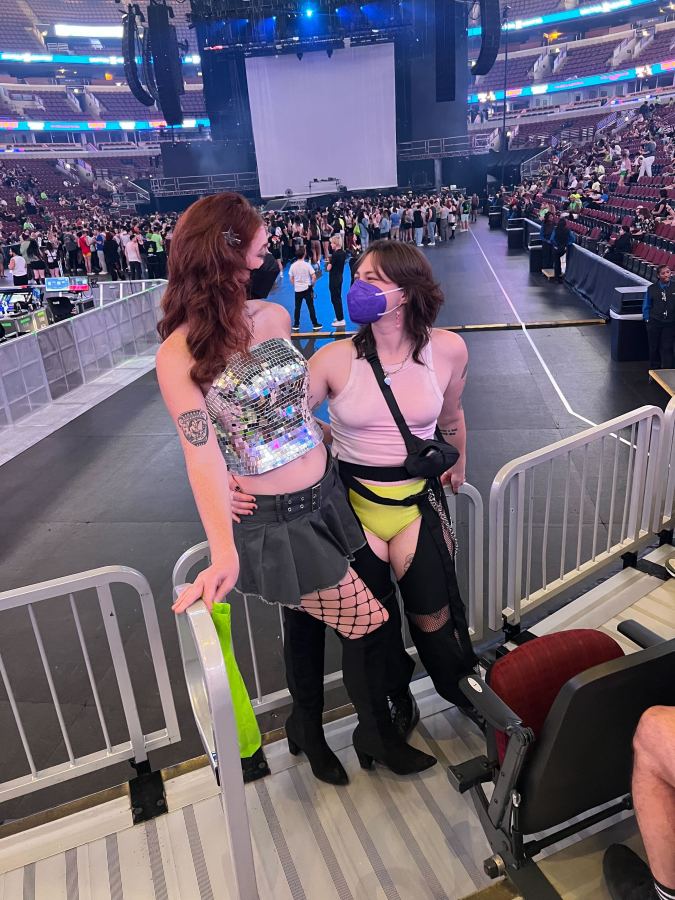
Troye came out in 2013 as a seemingly mild-mannered, young YouTuber at a time when mainstream acceptance of queerness was growing but still in its infant stage. And now, in 2024, he is owning the power of his sexuality. Songs like “Bloom,” “STUD,” and of course “Rush” are songs about the gay experience, unabashedly, and while of course anyone can enjoy them, they are meant to be a reflection of what it means to be a gay man in love, desire, and life. To assert that gay sexuality should be allowed to be loud and dirty, that the joy of queer sexuality can exist as easily as Charli’s powerful straight female sexuality.
In many ways, the SWEAT Tour is an assertion that one’s enjoyment of sex and clubbing and music is more than a shallow hobby: It is a reminder that, amidst a terrifying world, we are allowed to make moments for pure fun. To me, this is what made brat so popular — its tracklist contains songs like “I think about it all the time” and “Sympathy is a knife,” songs that take seriously Charli’s concern regarding pop star perception. “When you’re looking at the mirror, you’re just looking at me” is not just a fun line, but a lyrical example of the album’s conceit: What does it mean to be looked at but not seen? What does it mean to have to live up to the persona rather than the person — and who is the person? To me, this is what makes brat’s sillier, clubbier tracks so enjoyable. They are sandwiched between songs that are fearful, angry, sorrowful. Is this not the clubbing experience: Between flashing purple strobe and pumping bass, have we all not taken a moment between the vodka sours to think, am I happy, am I good enough, is this the life I want? Maybe not, maybe I’m just a poet — but to me, what makes the lively songs so enjoyable to throw my body around to are the songs that remind me why I need those “shallow” tracks. This is where lies the not-so-secret humanity of brat, and by extension Troye’s discography as well.
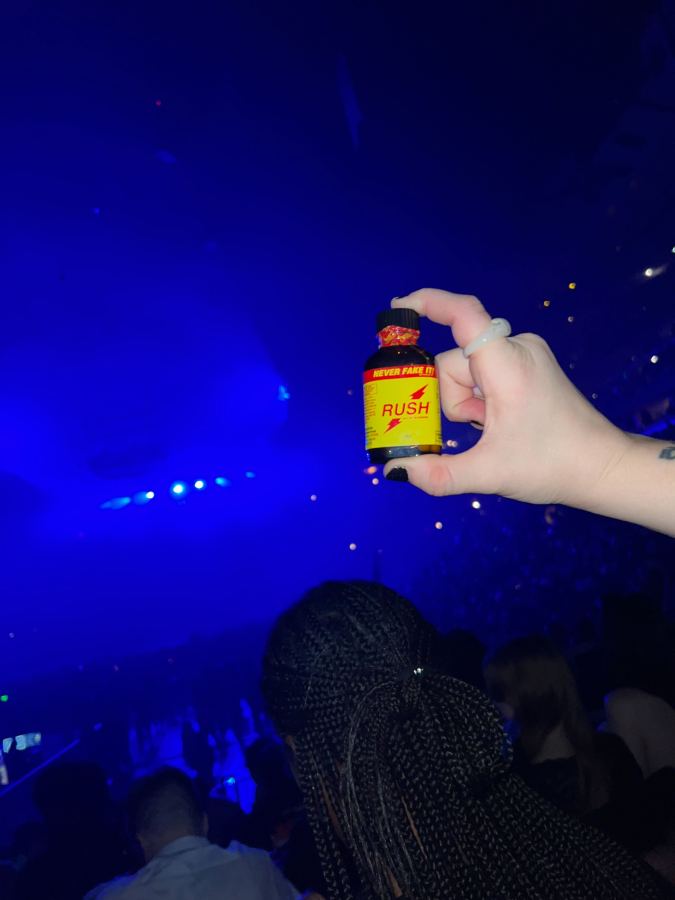
Ending the show on their collab/remix of “Talk talk,” Troye in leather chaps and bright tighty-whities, and Charli in sequin harem pants and a cropped Bears jersey holding a glass of white wine in her non-microphone hand, put a firm exclamation mark on a night of raucous debauchery. Being there in the glow of a thousand splendid red lights, with some of the people I love most nearby me dancing and feeling what I was feeling, I was reminded of why shows like this are crucial as well as entertaining. What is the point of life, the point of working and suffering, if we can’t culminate all that with dancing? To some, it may seem imbecilic to come away from a show like SWEAT Tour with a spiritual awakening, but to me, it is the root of why we love shows like this. Because if I have to suffer through so much, what I should be able to see at the end of that doorway should be an opportunity to dance, to love, to sweat.








Comments
Is troye an honorary butch twink? Pls tell em ur butch for femme